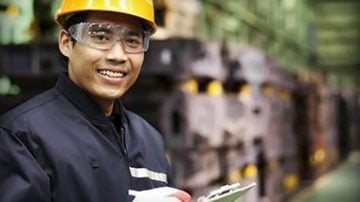HVAC technicians play a crucial role in maintaining the efficient operation of heating, ventilation, and air conditioning systems in commercial buildings, particularly during the demanding winter season. As they tirelessly work to keep indoor spaces comfortable, it is equally important to emphasize the significance of safety compliance in their line of work.
Safety compliance not only safeguards the well-being of HVAC technicians but also ensures a safe working environment for all. In this article, we will delve into the importance of safety compliance for HVAC technicians in commercial buildings, highlighting the essential role it plays in protecting both the workforce and the overall functionality of these vital systems.
Understanding the Responsibilities of HVAC Technicians
HVAC technicians have a diverse range of responsibilities when it comes to installing, maintaining, and repairing heating systems in commercial buildings. Their expertise is important for ensuring the comfort, efficiency, and safety of building occupants.
Key Responsibilities of HVAC Technicians
- Installation of Heating Systems: HVAC technicians are responsible for installing heating systems in commercial buildings. This includes assessing the heating requirements of the space, selecting appropriate equipment, and ensuring proper installation according to industry standards and regulations. They must also conduct tests to verify the functionality and efficiency of the system.
- Maintenance and Inspection: Regular maintenance is essential to keep heating systems running smoothly. HVAC technicians are responsible for conducting routine inspections, cleaning components, and performing necessary repairs or replacements. By addressing any issues promptly, they prevent potential breakdowns, extend the lifespan of the system, and maintain optimal energy efficiency.
- Troubleshooting and Repairs: When heating systems malfunction, HVAC technicians play a vital role in diagnosing and resolving issues. They possess the technical knowledge and skills to troubleshoot problems, identify faulty components, and perform repairs. Prompt and efficient repair work ensures uninterrupted heating and minimizes discomfort for building occupants.
- Energy Efficiency Optimization: HVAC technicians are responsible for optimizing energy efficiency in commercial buildings. They analyze heating system performance, recommend energy-saving measures, and implement strategies to reduce energy consumption. By doing so, they help businesses lower operational costs and contribute to sustainable practices.
- Indoor Air Quality Maintenance: HVAC technicians also play a critical role in maintaining indoor air quality. They ensure that heating systems are clean and properly filter and circulate air. This helps to remove pollutants, allergens, and improve ventilation, contributing to a healthier and more comfortable environment for building occupants.
- Safety Compliance: HVAC technicians have a paramount responsibility to ensure the safety of building occupants. They adhere to safety protocols when working with heating systems, including proper handling of electrical components, insulation materials, and hazardous gases. By following safety guidelines and regulations, they minimize the risk of accidents, fires, or exposure to harmful substances.
To get an accurate estimate of the fees for your specific circumstances, it's recommended to contact ISNetworld® or consult with a safety compliance expert.
The Importance of Safety Precautions in HVAC Operations
Implementing safety measures helps to prevent accidents, injuries, and potential hazards that can arise during HVAC work. It is essential for HVAC technicians to be aware of the potential risks involved and take appropriate safety precautions to protect themselves and others.
HVAC Operations Potential Risks
- Electrical Hazards: HVAC systems rely on electrical components and power sources. This introduces the risk of electrical shocks, burns, or fires if safety precautions are not followed. HVAC technicians must be knowledgeable about electrical safety and take steps to mitigate these risks, such as de-energizing equipment before maintenance or repair work, using insulated tools, and following lockout/tagout procedures.
- Exposure to Harmful Substances: HVAC operations may involve working with chemicals, refrigerants, and gases that can be harmful if mishandled or inhaled. For example, refrigerants can cause frostbite or respiratory issues, and certain cleaning agents may be toxic. Proper ventilation, personal protective equipment (PPE), and adherence to safety guidelines are essential to minimize the risk of exposure and protect the health of HVAC technicians.
- Working at Heights: HVAC technicians often need to work at heights when installing or maintaining rooftop units or ductwork. Falls from heights can result in severe injuries. To mitigate this risk, technicians should use appropriate fall protection equipment, such as harnesses and safety lanyards, and ensure that work platforms or scaffolding are secure and stable.
- Equipment Safety: HVAC technicians rely on a range of equipment, including power tools and machinery. Without proper training and caution, improper use or maintenance of equipment can lead to accidents. Following manufacturer guidelines, conducting regular inspections, and ensuring equipment is in good working condition are essential for preventing equipment-related incidents.
Industry Regulations and Compliance for HVAC Technicians
HVAC technicians must comply with relevant industry regulations to ensure safety, quality, and standardization in their work. Adhering to regulations such as OSHA, EPA, NFPA, and IMC helps create a safe working environment, protect the environment, and maintain the functionality and efficiency of HVAC systems. Platforms like ISNetworld® play a vital role in verifying and managing contractor compliance, further enhancing safety and standardization in the HVAC industry.
HVAC Industry Regulations
- Occupational Safety and Health Administration (OSHA): OSHA sets forth regulations and standards aimed at ensuring workplace safety and health. HVAC technicians must comply with OSHA guidelines, including proper handling of hazardous materials, electrical safety protocols, fall protection measures, and the use of personal protective equipment. Compliance with OSHA regulations helps mitigate potential risks and creates a safe working environment.
- Environmental Protection Agency (EPA): The EPA regulates the handling and disposal of refrigerants used in HVAC systems to prevent environmental harm. HVAC technicians must comply with EPA regulations, such as proper refrigerant recovery, recycling, and documentation. This ensures the responsible management of refrigerants and reduces their impact on the ozone layer and climate change.
- National Fire Protection Association (NFPA): The NFPA establishes fire safety codes and standards that HVAC technicians must follow. These codes include guidelines for electrical installations, fire protection systems, and combustible materials. Compliance with NFPA standards minimizes the risk of fires and promotes the overall safety of commercial buildings.
- International Mechanical Code (IMC): The IMC provides regulations for mechanical systems, including heating, ventilation, and air conditioning. HVAC technicians must adhere to IMC guidelines when designing, installing, and maintaining HVAC systems in commercial buildings. Compliance with IMC standards ensures the functionality, efficiency, and safety of these systems.
Role of ISNetworld® in Safety Compliance
ISNetworld® plays a significant role in ensuring safety compliance and standardization in the HVAC industry. ISNetworld® is an online contractor management platform that enables organizations to assess the safety performance and compliance of contractors and suppliers. HVAC companies and technicians registered with ISNetworld® undergo rigorous evaluation to verify their adherence to safety standards, regulatory requirements, and best practices.
ISNetworld® provides a centralized platform for companies to monitor and manage contractor compliance with industry regulations. It helps ensure that HVAC technicians working in commercial buildings meet the necessary safety qualifications, certifications, and training requirements. By promoting safety compliance and standardization, ISNetworld® enhances the overall quality and professionalism in the HVAC industry.
Learn more about utilizing your ISN® membership to promote and market your business allowing you to boost your profits with your ISNetworld® account.
Key Safety Measures for HVAC Technicians
HVAC technicians must prioritize safety to protect themselves, their colleagues, and building occupants. HVAC technicians can significantly reduce the risk of accidents, injuries, and potential hazards while working in commercial buildings if they make safety culture a priority.
- Personal Protective Equipment (PPE): HVAC technicians should always wear the appropriate PPE to protect themselves from potential hazards. This may include safety goggles, gloves, hard hats, steel-toed boots, and respiratory protection when working with chemicals or in dusty environments. Wearing PPE safeguards against injuries, exposure to harmful substances, and enhances overall safety on the job.
- Proper Handling of Refrigerants: HVAC technicians must handle refrigerants in a safe and responsible manner. This involves following EPA guidelines for refrigerant recovery, recycling, and disposal. Technicians should use approved recovery equipment, avoid contamination, and handle refrigerants in well-ventilated areas. Proper handling of refrigerants minimizes the risk of leaks, environmental harm, and potential health hazards.
- Electrical Safety: Electrical hazards are common in HVAC work, and technicians must take precautions to mitigate these risks. This includes shutting off power before working on electrical components, using lockout/tagout procedures, and properly grounding equipment. HVAC technicians should also be trained in electrical safety and understand how to identify and address potential electrical hazards.
- Fall Protection: HVAC technicians often work at heights, such as on rooftops or elevated platforms. To prevent falls, technicians should utilize proper fall protection measures. This may include wearing harnesses, using safety lanyards, and ensuring stable work platforms or scaffolding. Implementing fall protection measures reduces the risk of serious injuries and promotes a safe working environment.
- Ladder Safety: When using ladders, HVAC technicians should follow proper ladder safety protocols. This includes securing the ladder, placing it on stable ground, and maintaining three points of contact while climbing. Technicians should also ensure that ladders are in good condition and free from defects before use.
- Tool and Equipment Safety: Proper use and maintenance of tools and equipment are crucial for safety. HVAC technicians should regularly inspect their tools for damage, wear appropriate protective guards, and follow manufacturer guidelines for their operation. It is essential to keep tools in good working condition to prevent accidents or injuries.
- Communication and Awareness: Effective communication and situational awareness are key to maintaining a safe work environment. HVAC technicians should communicate with their team members, supervisors, and building occupants to ensure everyone is aware of potential hazards. This includes communicating about ongoing work, marking off hazardous areas, and displaying appropriate signage.
Ensuring Safety in HVAC Operations
To ensure safety in their day-to-day operations, HVAC technicians should follow practical tips and guidelines that prioritize the well-being of themselves and building occupants. Regular maintenance, conducting risk assessments, proper communication with building occupants, adherence to manufacturer guidelines, handling hazardous materials safely, proper tool usage, and emergency preparedness all contribute to a safe working environment and ensure the well-being of everyone involved.
- Regular Maintenance: Regular maintenance of HVAC systems is vital for safety. Technicians should adhere to manufacturer recommendations and industry standards for inspections, cleaning, and servicing. Routine maintenance helps identify and address potential issues before they lead to equipment failures or safety hazards.
- Conducting Risk Assessments: Before starting any HVAC work, technicians should conduct thorough risk assessments. This involves identifying potential hazards, evaluating their impact, and implementing appropriate control measures. By assessing risks, technicians can proactively mitigate potential dangers and plan their work accordingly.
- Proper Communication with Building Occupants: Effective communication with building occupants is essential for safety. Technicians should inform occupants about ongoing maintenance or service work, including any necessary precautions or temporary disruptions. Clear signage and communication help prevent accidents and minimize inconvenience for occupants.
- Following Manufacturer Guidelines: HVAC technicians should always follow manufacturer guidelines for installation, maintenance, and repairs. These guidelines outline best practices and safety procedures specific to the equipment being worked on. Adhering to manufacturer guidelines ensures proper functioning of the systems and reduces the risk of accidents.
- Handling Hazardous Materials: HVAC work may involve handling hazardous materials such as refrigerants or cleaning chemicals. Technicians should receive proper training on the safe handling, storage, and disposal of these substances. Following recommended procedures and using appropriate personal protective equipment (PPE) minimizes the risk of exposure and associated health hazards.
- Proper Tool Usage: Using tools correctly is crucial for safety. Technicians should use the right tools for the job and ensure they are in good working condition. Misusing tools or using damaged equipment can lead to accidents and injuries. Regular inspection and maintenance of tools are essential for safe operations.
- Emergency Preparedness: HVAC technicians should be prepared for emergency situations. This includes knowing the location and operation of emergency shut-off switches, fire extinguishers, and safety exits. Technicians should also have a clear understanding of emergency procedures and how to respond in case of accidents or equipment malfunctions.
The Benefits of Safety Compliance for HVAC Technicians
Maintaining safety compliance brings numerous benefits to HVAC technicians and the organizations they work for. Improved efficiency, reduced downtime, enhanced worker safety, improved credibility, legal and financial protection, and a positive work culture are all advantages of prioritizing safety compliance.
- Improved Efficiency: When technicians adhere to safety compliance standards, they create a streamlined and efficient workflow. By following proper procedures and using appropriate safety protocols, technicians can avoid accidents, injuries, and equipment damage. This leads to uninterrupted work processes, minimizing disruptions and maintaining productivity levels.
- Reduced Downtime: Safety compliance plays a crucial role in reducing downtime. When technicians prioritize safety, they are less likely to encounter accidents or make mistakes that result in equipment breakdowns. By preventing unplanned downtime, organizations can save valuable time, resources, and revenue. Timely completion of projects and maintenance tasks is facilitated through a focus on safety compliance.
- Enhanced Worker Safety: The primary benefit of safety compliance is the protection of workers. By following safety regulations, technicians minimize the risk of accidents, injuries, and occupational hazards. This includes using personal protective equipment (PPE), implementing proper handling techniques, and adhering to industry standards. When workers feel safe and secure in their environment, job satisfaction increases, leading to better overall performance.
- Improved Credibility: Safety compliance enhances the credibility of HVAC technicians and the organizations they represent. Clients and customers value companies that prioritize safety, as it demonstrates professionalism and a commitment to quality. Maintaining safety compliance certifications and adhering to industry regulations builds trust and confidence among clients, which can lead to repeat business and positive word-of-mouth recommendations.
- Legal and Financial Protection: Compliance with safety regulations helps protect technicians and organizations from legal liabilities and financial risks. Failure to comply with safety standards can result in costly fines, penalties, and legal consequences. By prioritizing safety compliance, HVAC technicians can mitigate these risks and ensure both their personal and organizational financial well-being.
- Positive Work Culture: Safety compliance fosters a positive work culture within HVAC organizations. When safety is given top priority, it creates a sense of responsibility, accountability, and teamwork among technicians. Employees feel valued and supported, leading to higher morale and satisfaction. A positive work culture contributes to increased productivity, better collaboration, and overall success.
Work with Industrial Compliance and safety for HVAC Safety and compliance
We are a global pre-qualification assistance company based out of Charlotte, NC with over 20 years of expertise in ISNetworld®, Avetta®, PEC® Premier, and all the other large and small certification systems out there. We excel in assessing and creating custom safety programs that are tailored to each client’s request for a variety of industrial businesses across the globe.
WE ARE PASSIONATE
As dedicated safety compliance consultants, we have a proven record of accomplishment and are a reputable company in the United States. We ensure that all our work is done with utmost professionalism using our expert knowledge in safety compliance.
HONEST AND DEPENDABLE
We are transparent with our services, costs, and programs. We value your trust in us to evaluate and meet your company’s needs. We take pride in proving ourselves reliable and trustworthy as we build our working relationship with one another!
COMPETITIVE PRICING
We offer a great service that is at a low cost to you! Talk to one of our certification experts today to get a quote!
YOUR TIME IS IMPORTANT
We value your time as an owner or manager running a business. Open communication that provides clear and realistic expectations on deadlines and schedules is key. Industrial Compliance & Safety provides the most cost-effective and efficient products to you and your business.
Safety compliance is not merely a requirement but a fundamental commitment that every HVAC technician should prioritize. By adhering to safety guidelines, receiving proper training, and staying up-to-date with industry regulations, HVAC technicians can ensure that every project they undertake is not only efficient but also conducted with the highest regard for safety. Ultimately, the importance of safety compliance cannot be overstated; it's the foundation upon which a successful and secure HVAC career is built. Contact Industrial Compliance & Safety today to prioritize your team's safety with compliance certification.
Ready To Get Compliant Today?
Call us or complete the form below!





